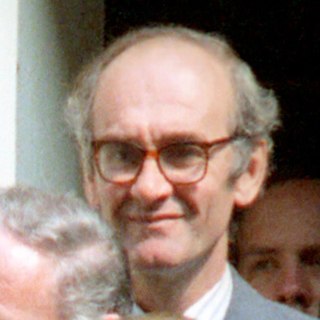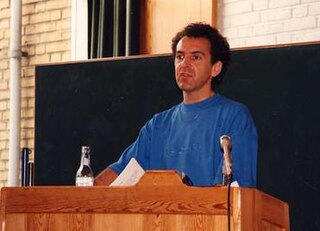Related Research Articles

Norman Beresford Tebbit, Baron Tebbit is a British politician. A member of the Conservative Party, he served in the Cabinet from 1981 to 1987 as Secretary of State for Employment (1981–1983), Secretary of State for Trade and Industry (1983–1985), and Chancellor of the Duchy of Lancaster and Chairman of the Conservative Party (1985–1987). He was a Member of Parliament (MP) from 1970 to 1992, representing the constituencies of Epping (1970–1974) and Chingford (1974–1992).

Thatcherism is a form of British conservative ideology named after Conservative Party leader Margaret Thatcher that relates to not just her political platform and particular policies but also her personal character and style of management while in office. Proponents of Thatcherism are referred to as Thatcherites. The term has been used to describe the principles of the British government under Thatcher from the 1979 general election to her resignation in 1990, but it also receives use in describing administrative efforts continuing into the Conservative governments under John Major and David Cameron throughout the 1990s and 2010s. In international terms, Thatcherites have been described as a part of the general socio-economic movement known as neoliberalism, with different countries besides the United Kingdom sharing similar policies around expansionary capitalism.

Sir Edward MacMillan Taylor, known as Teddy Taylor, was a British Conservative Party politician who was a Member of Parliament (MP) for forty years, from 1964 to 1979 for Glasgow Cathcart and from 1980 to 2005 for Southend East.

The Tory Reform Group (TRG) is a pressure group associated with the British Conservative Party that works to promote "modern, progressive Conservatism... economic efficiency and social justice" and "a Conservatism that supports equality, diversity and civil liberties", values sometimes associated with Harold Macmillan's "Middle Way" or what the groups consider a moderate one-nation conservatism. Senior figures include Michael Heseltine, Douglas Hurd, Ken Clarke, and Chris Patten.

Nicolas John Gibb is a British politician serving as Minister of State for Schools since October 2022, having previously held the office from 2010 to 2012 and again from 2015 to 2021. He has served at the Department for Education under Conservative Prime Ministers David Cameron, Theresa May, Boris Johnson and Rishi Sunak. A member of the Conservative Party, Gibb has served as Member of Parliament (MP) for Bognor Regis and Littlehampton since 1997.
The Freedom Association (TFA) is a pressure group in the United Kingdom that describes itself as "a non-partisan, classically liberal campaign group, which has links to the Conservative Party and UK Independence Party (UKIP). TFA was founded in 1975 as the National Association for Freedom (NAFF) and gained public prominence through its anti-trade union campaigns. Its popularity grew after campaigning against perceived abuses to individual freedom including big business, big government, organised labour and Irish political violence. By the end of the 1970s the organisation had around 20,000 members.
The Young Conservatives (YC) is the youth wing of the Conservative Party in the United Kingdom for members aged 25 and under. The organisation shares the same values and policies as its parent political party with branches being an integrated part of local associations. College and university branches are not included, but run independently.
Richard Thain Alexander was a Conservative Party politician in the United Kingdom. He was Member of Parliament (MP) for Newark in Nottinghamshire until losing his seat in the landslide of the 1997 general election.

Sir John William Frederic Nott is a former British Conservative Party politician. He was a senior politician of the late 1970s and early 1980s, playing a prominent role as Secretary of State for Defence during the 1982 invasion of the Falkland Islands and subsequent Falklands War.
This article gives an overview of liberal parties in Brazil. It is limited to liberal parties with substantial support, mainly proved by having had a representation in parliament. The sign ⇒ means a reference to another party in that scheme. For inclusion in this scheme it isn't necessary so that parties labeled themselves as a liberal party.
Centre-right politics lean to the right of the political spectrum, but are closer to the centre. Parties of the centre-right generally support liberal democracy, capitalism, the market economy, private property rights, and a modest welfare state. They support conservatism and economic liberalism and oppose socialism and communism.

In the United Kingdom during the 1980s, “Wets” was an epithet used for liberal conservatives within the Conservative Party who opposed some of the more hard-line policies of Prime Minister Margaret Thatcher. Thatcher coined the usage in 1979–80, with the meaning of feeble, lacking hardness, or willing to compromise with the unions. The label was especially applied to senior members of her government who were nevertheless outside Thatcher's inner circle and who expressed opposition to her strict monetarist policies designed to tackle inflation, and her cuts to public spending.

Christopher Ronald Tame was a British libertarian political activist. He is best known as the founder and Director of the Libertarian Alliance, a free market and civil liberties think tank.

Francis Nigel Forman was a British Conservative politician. After working in the Conservative Research Department from 1968 to 1976 he was elected as an MP. He became a junior minister, Minister of Higher Education, in April 1992, but resigned from that office after 8 months.
Libertarianism in the United Kingdom can either refer to a political movement synonymous with anarchism, left-libertarianism and libertarian socialism, or to a political movement concerned with the pursuit of propertarian right-libertarian ideals in the United Kingdom which emerged and became more prominent in British politics after the 1980s neoliberalism and the economic liberalism of the premiership of Margaret Thatcher, albeit not as prominent as libertarianism in the United States in the 1970s and the presidency of Republican Ronald Reagan during the 1980s.

Richard Quentin Fuller is a British politician who served as the Economic Secretary to the Treasury from July to October 2022. He has been Member of Parliament (MP) for North East Bedfordshire since 2019. A member of the Conservative Party, he represented Bedford from 2010 to 2017. He had previously achieved prominence as leader of the Young Conservatives from 1985 to 1987.
The Oxford University Conservative Association (OUCA) is a student Conservative association founded in 1924, whose members are drawn from the University of Oxford. Since October 2009, OUCA has been affiliated with Conservative Future and its successor, the Young Conservatives, the Conservative Party youth wing.
Iain Sutherland Picton was a political activist in the Conservative Party, representing the One Nation tradition Toryism, and a television producer.
Philip Pedley is a British Conservative activist who held a number of positions in the Conservative Party at local, regional and national level and was appointed Deputy Chairman of one of the largest quangos in Wales. He was educated at Calday Grange Grammar School and Lancaster University.
Douglas "Dougie" Smith is a British political advisor who has worked as a senior Conservative Party aide for British prime ministers David Cameron, Theresa May and Boris Johnson, although according to The Daily Telegraph his precise role is uncertain. He was formerly a political advisor to Sir James Mancham, former President of Seychelles, and Sir James Goldsmith.
References
- 1 2 3 "Conservative Party Archive". www.bodley.ox.ac.uk. Retrieved 4 April 2019.
- 1 2 "BBC Desert Island Discs Interview 2007". bbc.co.uk. 2 March 2007. Retrieved 19 July 2016.
- ↑ Happold, Tom (8 October 2003). "Tory youth group accused of take-over plot". The Guardian Unlimited. London.
- 1 2 John Stevens (21 August 1986). "Tories sue student editor over Macmillan war crimes charges". The Sydney Morning Herald. p. 9.
- ↑ Barberis, Peter; McHugh, John; Tyldesley, Mike (1 January 2000). Encyclopedia of British and Irish Political Organizations: Parties, Groups and Movements of the 20th Century. A&C Black. ISBN 9780826458148.
- ↑ "No2NUS". Archived from the original on 29 September 2007.
- 1 2 3 4 5 6 7 8 9 Phibbs, Harry (30 October 2006). "FCS twenty years on – Harry Phibbs remembers his days in the Federation of Conservative Students". Social Affairs Unit . Archived from the original on 11 September 2012. Retrieved 17 November 2006.
- ↑ "Right Now! A forum for eugenecists". Searchlight magazine . July 1998. Archived from the original on 18 November 2006.
- ↑ Glendening, Marc (5 April 2006). "Chris Tame". The Guardian.
- ↑ "The Federation of Conservative Students – Tory Diary". ConservativeHome.
- ↑ Macleod, Angus (12 July 2005). "Tory turmoil as Monteith leaves post". The Times. London.
- ↑ "New Model Tories: Tory tribes". The Independent. London. 24 September 2006. Archived from the original on 6 July 2008.
- ↑ Elliot, John (22 June 2003). "Top Tory aide is king of the urban swingers" . The Sunday Times. London. Archived from the original on 10 April 2021. Retrieved 5 February 2022.
- ↑ "The most expensive MP at Westminster". The Guardian. 4 November 2002.
- ↑ Wisnom, Selena (28 November 2007). "OUTRG merges with OUCA". Cherwell. Retrieved 26 June 2013.
- ↑ Nadler, Jo-Anne (4 December 2004). "The curse of Tory Boy". The Guardian. London.
- ↑ Nadler, Jo-Anne (2004). Too Nice to be a Tory: It's My Party and I'll Cry If I Want To. Simon & Schuster, 2004. p. 81. ISBN 9780743220767.
- 1 2 Evans, Timothy (1996). Conservative Radicalism: A Sociology of Conservative Party Youth Structures and Libertarianism 1970–1992. Berghahn Books. p. 36 (footnotes 107 and 108, citing the Daily Telegraph of 4 April 1985). ISBN 1-57181-872-3.
- ↑ Norman, Margot (6 April 1985). "unknown title". The Daily Telegraph. p. 37.
- 1 2 "Letters to the Editor". The Times. 12 April 1985.
- ↑ "Letters to the Editor". The Observer. 7 April 1985.
- ↑ "Letters to the Editor". Sunday Times. 14 April 1985.
- 1 2 Hames, Tim. "A Burst of Freedom". BBC Radio 4.
- ↑ Archer, Graeme (27 February 2004). "Michael Hooker". The Daily Telegraph. London. Archived from the original on 23 September 2004. Retrieved 5 August 2021.
- ↑ Asthana, Anushka (11 October 2003). "Sir Antony Buck". The Times. London.
- ↑ "Sir Dennis Walters". Who's Who.
- ↑ Asthana, Anushka (20 July 2005). "Lord Carlisle of Bucklow". The Times. London.
- ↑ Goltz, Anna von der; Waldschmidt-Nelson, Britta (7 April 2017). Inventing the Silent Majority in Western Europe and the United States. Cambridge University Press. ISBN 978-1-107-16542-7.
- ↑ Pierce, Andrew (17 June 2005). "The backstreet bruiser hoping to knock sense into the Tories". The Times. London.
- ↑ "Forsyth of Drumlean" . Who's Who . Vol. 2023 (online ed.). A & C Black.(Subscription or UK public library membership required.)
- ↑ Ian Bradley, "Leading young Tories defect to join SDP", The Times, 12 August 1981, p. 1.
- ↑ Kite, Melissa (5 November 2002). "Frontbencher refused to 'go missing' again". The Times. London.